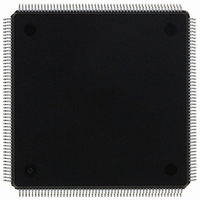MCF5307AI90B Freescale Semiconductor, MCF5307AI90B Datasheet - Page 52

MCF5307AI90B
Manufacturer Part Number
MCF5307AI90B
Description
IC MPU 32BIT COLDF 90MHZ 208FQFP
Manufacturer
Freescale Semiconductor
Series
MCF530xr
Datasheets
1.MCF5307AI66B.pdf
(484 pages)
2.MCF5307AI66B.pdf
(16 pages)
3.MCF5307AI66B.pdf
(2 pages)
Specifications of MCF5307AI90B
Core Processor
Coldfire V3
Core Size
32-Bit
Speed
90MHz
Connectivity
EBI/EMI, I²C, UART/USART
Peripherals
DMA, POR, WDT
Number Of I /o
16
Program Memory Type
ROMless
Ram Size
4K x 8
Voltage - Supply (vcc/vdd)
3 V ~ 3.6 V
Oscillator Type
External
Operating Temperature
0°C ~ 70°C
Package / Case
208-FQFP
Maximum Clock Frequency
90 MHz
Maximum Operating Temperature
+ 105 C
Mounting Style
SMD/SMT
Minimum Operating Temperature
0 C
Family Name
MCF5xxx
Device Core
ColdFire
Device Core Size
32b
Frequency (max)
90MHz
Instruction Set Architecture
RISC
Supply Voltage 1 (typ)
3.3V
Operating Temp Range
0C to 70C
Operating Temperature Classification
Commercial
Mounting
Surface Mount
Pin Count
208
Package Type
FQFP
Program Memory Size
8KB
Cpu Speed
90MHz
Embedded Interface Type
I2C, UART
Digital Ic Case Style
FQFP
No. Of Pins
208
Supply Voltage Range
3V To 3.6V
Rohs Compliant
Yes
Lead Free Status / RoHS Status
Lead free / RoHS Compliant
Eeprom Size
-
Program Memory Size
-
Data Converters
-
Lead Free Status / Rohs Status
Lead free / RoHS Compliant
Available stocks
Company
Part Number
Manufacturer
Quantity
Price
Company:
Part Number:
MCF5307AI90B
Manufacturer:
FREESCAL
Quantity:
153
Company:
Part Number:
MCF5307AI90B
Manufacturer:
Freescale Semiconductor
Quantity:
10 000
Part Number:
MCF5307AI90B
Manufacturer:
FREESCALE
Quantity:
20 000
- Current page: 52 of 484
- Download datasheet (6Mb)
Programming Model, Addressing Modes, and Instruction Set
The PLL module’s three modes of operation are described as follows.
1.4 Programming Model, Addressing Modes, and
The ColdFire programming model has two privilege levels—supervisor and user. The S bit
in the status register (SR) indicates the privilege level. The processor identifies a logical
address that differentiates between supervisor and user modes by accessing either the
supervisor or user address space.
1-12
• Reset mode—When RSTI is asserted, the PLL enters reset mode. At reset, the PLL
• Normal mode—In normal mode, the input frequency programmed at reset is
• Reduced-power mode—In reduced-power mode, the PCLK is disabled by executing
• User mode—When the processor is in user mode (SR[S] = 0), only a subset of
• Supervisor mode—This mode protects system resources from uncontrolled access
asserts RSTO from the MCF5307. The core:bus frequency ratio and other MCF5307
configuration information are sampled during reset.
clock-multiplied to provide the processor clock (PCLK).
a sequence that includes programming a control bit in the system configuration
register (SCR) and then executing the STOP instruction. Register contents are
retained in reduced-power mode, so the system can be reenabled quickly when an
unmasked interrupt or reset is detected.
registers can be accessed, and privileged instructions cannot be executed. Typically,
most application processing occurs in user mode. User mode is usually entered by
executing a return from exception instruction (RTE, assuming the value of SR[S]
saved on the stack is 0) or a MOVE, SR instruction (assuming SR[S] is 0).
by users. In supervisor mode, complete access is provided to all registers and the
entire ColdFire instruction set. Typically, system programmers use the supervisor
programming model to implement operating system functions and provide I/O
Instruction Set
DIVIDE[1:0]
FREQ[1:0]
CLKIN
RSTI
Freescale Semiconductor, Inc.
For More Information On This Product,
CLKIN X 4
PLL
Figure 1-3. PLL Module
Go to: www.freescale.com
MCF5307 User’s Manual
Divide
by 2
Divide by 2,
3, or 4
RSTO
PCLK
PSTCLK
BCLKO
Related parts for MCF5307AI90B
Image
Part Number
Description
Manufacturer
Datasheet
Request
R
Part Number:
Description:
Manufacturer:
Freescale Semiconductor, Inc
Datasheet:
Part Number:
Description:
Mcf5307 Coldfire Integrated Microprocessor User
Manufacturer:
Freescale Semiconductor, Inc
Datasheet:
Part Number:
Description:
Manufacturer:
Freescale Semiconductor, Inc
Datasheet:
Part Number:
Description:
Manufacturer:
Freescale Semiconductor, Inc
Datasheet:
Part Number:
Description:
Manufacturer:
Freescale Semiconductor, Inc
Datasheet:
Part Number:
Description:
Manufacturer:
Freescale Semiconductor, Inc
Datasheet:
Part Number:
Description:
Manufacturer:
Freescale Semiconductor, Inc
Datasheet:
Part Number:
Description:
Manufacturer:
Freescale Semiconductor, Inc
Datasheet:
Part Number:
Description:
Manufacturer:
Freescale Semiconductor, Inc
Datasheet:
Part Number:
Description:
Manufacturer:
Freescale Semiconductor, Inc
Datasheet:
Part Number:
Description:
Manufacturer:
Freescale Semiconductor, Inc
Datasheet:
Part Number:
Description:
Manufacturer:
Freescale Semiconductor, Inc
Datasheet:
Part Number:
Description:
Manufacturer:
Freescale Semiconductor, Inc
Datasheet:
Part Number:
Description:
Manufacturer:
Freescale Semiconductor, Inc
Datasheet:
Part Number:
Description:
Manufacturer:
Freescale Semiconductor, Inc
Datasheet:











